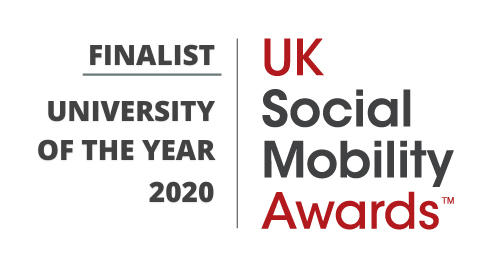The ���Ӷ���Ƶ has been shortlisted for University of the Year in the UK Social Mobility Awards for the second year in succession.

The Awards recognise best practice and innovation and celebrate excellence and achievement among organisations across the UK working to improve social mobility.
Over a decade ago, Worcester pioneered and then developed the ‘whole university approach’ to providing inclusive, quality education and lifelong learning opportunities for all.
Professor David Green CBE, Worcester’s Vice Chancellor and Chief Executive, said: “We are delighted to be shortlisted for University of the Year in the UK Social Mobility Awards for the second year running. As a university we are committed to helping individuals to make the most of their own potential by providing the opportunity to earn a top-quality education as well as the skills, support and encouragement students need to go on to rewarding careers. This virtuous circle of achievement has huge benefits for society as a whole, as well as individuals.”
Throughout the 21st Century at least 97% of Worcester students have come from state schools. Currently more than 10% of students at the University have a declared disability. The University is consistently in the top 10 in the UK for sustained employment after graduation – highlighting the strength and relevance of a Worcester education.
The University has worked hard over many years to become a place where inclusion is a given and has long promoted the belief that everyone with the ability and determination to study for a higher education should have the opportunity to do so.
Poet, teacher, and spoken word performer, Casey Bailey, is a graduate and Fellow of the University. Born and raised in Nechells in Birmingham, he has worked tirelessly to tackle disadvantage, reduce inequality, and to ensure young people from disadvantaged backgrounds have the opportunity to discover their own rich potential.
“When entering higher education at the ���Ӷ���Ƶ I never really grasped the extent to which it would transform my life,” he said. “The qualifications I achieved, taking charge of my own life and learning fully for the first time and most importantly the people who I met were the catalyst to life-long growth. Working as a senior leader in a comprehensive secondary school, I am clear that our education is not perfect, but I am equally convinced that education holds the key to creating change on both an individual and systemic level. I am proud, as always, of the ���Ӷ���Ƶ and know that this recognition is deserved.”
Worcester’s approach to social mobility extends well beyond its own campus.
The University has committed to developing facilities that are open to the community, raising aspirations from the earliest age to aid social mobility. These include The Hive, Europe’s first integrated university and public library, which has now welcomed over 6 million visitors and was named the UK’s best large library by the Society of College, National and University Librarians from 2016-2019.
In the 2020 National Student Survey 91.9% of students were satisfied with Worcester’s Learning Resources, placing Worcester in the top 10 of all universities and ranked 11th out of 149 higher education institutions. In the Survey, more than 85% of Worcester final year students said they were satisfied overall, above the national average of 82.3% and putting it as one of the top scoring universities in the Midlands. Fourteen courses, including Primary Initial Teacher Education: Early Years, Midwifery, and Physiotherapy, receiving 100% satisfaction from graduating students. Worcester was ranked first in 8 subjects areas including Midwifery and Physical Geography.
The ���Ӷ���Ƶ is currently in the top three in the UK for Quality Education and number one in the UK for Gender Equality in the Times Higher Education University Impact Rankings, which are based on universities’ records in contributing to achieving the United Nations’ globally agreed Sustainable Development Goals (SDGs).
Worcester was also recently Highly Commended in the International Green Gown Awards at the UN, after being named the UK’s Sustainability Institution of the Year at the end of last year.
Community volunteering and work-based placements and projects are very strong features of student life at the ���Ӷ���Ƶ – an approach to social mobility which has led the University’s graduates to be in the top 10 for sustained employment for 1, 3 and 5 years after graduation, according to the government-published Longitudinal Educational Outcomes data.